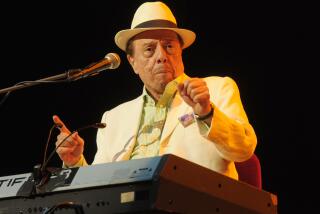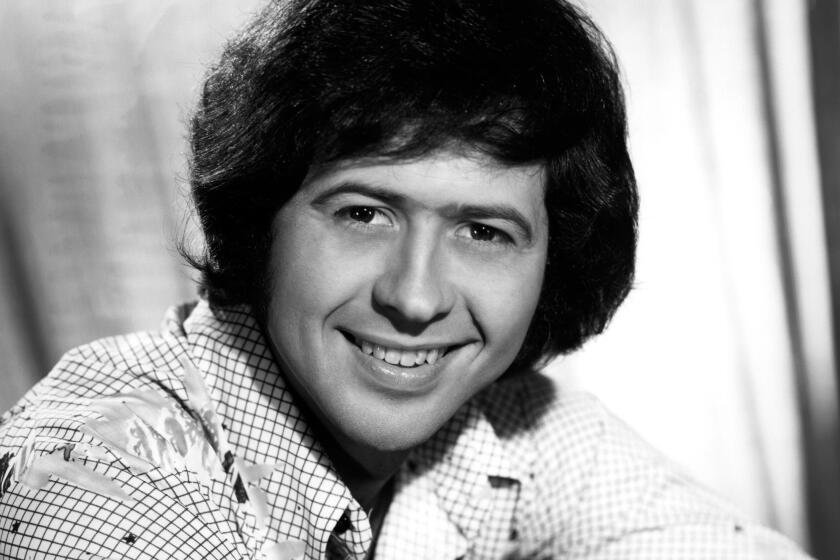For Vergueiro, It’s Not Simply Samba : Music: Brazilian artist wants to show Americans that it’s more than just something meant for carnival.
When you hear pianist Guilherme Vergueiro’s highly rhythmic, strongly melodic Brazilian music, you might think he’s blended a heavy jazz element with the strains of his native land. But don’t suggest that to him.
“I just play samba,” said the 37-year-old musician, who appears Friday and Saturday at Maxwell’s in Huntington Beach.
“The samba is the Brazilian jazz,” said Vergueiro, who hails from Sao Paulo and who has lived in North Hollywood for two years. “It has a very strong rhythm with very strong opportunities to go into different harmonies and melodies. It’s a big field of music.”
Indeed. Check the glossary at the back of “The Brazilian Sound,” the recent book by Chris McGowan and Ricardo Pessanha that is destined to become standard text on Brazilian music, and you’ll find entries for seven varieties of samba. There’s the generic definition of samba, which the book calls “the famous Brazilian song-dance . . . characterized by interlocking, syncopated lines in melody and accompaniment.” Vergueiro’s style is closer to Samba de gafieira, defined as a “dance-hall style of samba, generally instrumental . . . and influenced by American big-band jazz.”
Vergueiro is eager to make some of these distinctions clear to American audiences. “Samba is seen by many to just be a folkloric music that is heard during carnival,” he said. “I want to show that it’s much more than that, that it’s a way of using rhythm as a means of expression.”
The improvisational aspect of samba is what gives it a kinship to jazz, Vergueiro said. “In the soloing is where jazz and Brazilian music find each other,” he said. “So I guess that’s why everybody who enjoys jazz is able to enjoy samba music.”
And vice-versa, perhaps. At least it’s true in the case of Vergueiro. “I admire many other musicians: American, European, though in Brazil we heard mostly American jazz musicians,” he said. “I used to like very much the Miles Davis band with Herbie Hancock, and I . . . like Erroll Garner and Duke Ellington.”
Vergueiro, who can be a dynamo at the keyboard, playing with an exhilarating brand of enthusiasm, found himself attracted to such stylists as Garner, McCoy Tyner and Thelonious Monk because they are impossible to truly imitate.
“They have such a strong personality; that’s why I like them,” he said. “I have a strong personality, too, and I’m always looking to find myself, my way to play, not imitate or try to play like somebody else.”
That search for singularity, for a distinctive, unique voice, should be each musician’s goal, Vergueiro said. “Everyone can discover themselves in music,” he said. “You just have to try and find the music you have inside of you and express it.”
At Maxwell’s, Vergueiro will be accompanied by bassist Jose Marino, from the group Velas, and drummer Claudio Slon, one of the busiest Brazilian drummers in the Los Angeles area. Vocalist Ana Carolina will also be on hand to add a breath of lyric freshness to Vergueiro’s instrumental forays.
“I like her voice. It’s deep and very charming,” he said.
Vergueiro began classical piano studies at age 5 and continued for 12 years. But before he reached his teens, he discovered that a career as a concert pianist was not in the offing.
“I fell in love with the samba, and so I played all the classical songs with a samba rhythm,” he laughed. “My family found out very early that I was no good,” he said, laughing.
Still, Vergueiro is glad he went through the rigors of a classical curriculum. “It’s very important to have that training to create your own sound and your own way to play the nuances,” he said.
The pianist embarked on a professional career as a teen-ager, and at 19 landed in the United States. He lived for five years in New York City and formed a band, Love Carnaval and Dreams with ex-Cannonball Adderley bassist Walter Booker. He played at various clubs, including Cacajca, where he was musical director. Vergueiro returned to Brazil in 1979, and spent 10 years performing with the such singers as Djavan and Leny Andrade. He moved to Los Angeles in 1990.
“Brazil is a wonderful country, but its recording industry is not too good,” Vergueiro said. “Not too much instrumental music gets released, so Brazilian instrumental artists have to go somewhere else to get a record out.”
He has a few demo tracks in the can that he is shopping in hopes of landing a recording contract. So far there haven’t been any bites, and Vergueiro makes his living with jobs like Maxwell’s, and occasional appearances with other artists, such as R & B singer Leon Ware. “I’m getting him to add a little samba to his dance music,” he said.
Vergueiro also has appeared twice at the Moonlight Tango Cafe in Sherman Oaks, fronting a big band. The large ensemble is one of his pet projects. “A long time ago, there used to be a lot of big bands in Brazil, but that was an old conception, like what you’d hear in the movies with Carmen Miranda,” he said.
“I want to show that there can be a modern approach to this music,” he said, “so people will know we are still alive, still kicking.”
* Guilherme Vergueiro plays Friday and Saturday at 8:30 and 10:30 p.m. at Maxwell’s, 317 Pacific Coast Highway, Huntington Beach. $5 cover, plus $7 food or drink minimum. (714) 536-2555.
More to Read
The biggest entertainment stories
Get our big stories about Hollywood, film, television, music, arts, culture and more right in your inbox as soon as they publish.
You may occasionally receive promotional content from the Los Angeles Times.










